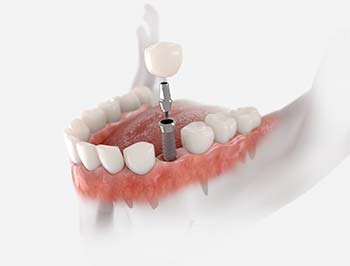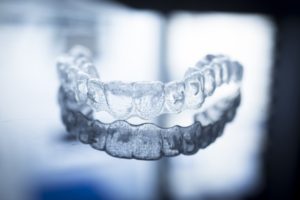There are two primary types of implants:
Traditional Dental Implants
As a general rule, since dental implants integrate with the jawbone, they are designed to be a permanent solution for missing teeth. This process is known as osseointegration and, once complete, the implant itself acts as a tooth root, creating a solid foundation for an artificial tooth. While the implant is permanent, approximately 50% to 80% of crowns must be replaced in about 15 to 20 years.
Mini Dental Implants
The primary difference between traditional and mini dental implants is the size. A mini dental implant is approximately the same size as a toothpick- less than 3 mm. Since they are smaller, the procedure is less invasive and they can be placed in areas with low jawbone density.
Mini dental implants are often used to secure removable dentures or to replace a single tooth for patients who have small teeth. While mini dental implants are also designed to be permanent, research on their success is limited. However, a systematic review of 4 studies in 2019 showed no difference between the lifespan of traditional implants compared to the lifespan of mini dental implants.
Implant-Supported Dentures
Patients who are missing most or all of their teeth may choose implant-supported dentures, which is a restorative procedure involving 2 to 4 dental implants to support several teeth to an entire arch. Again, when cared for properly, the implants themselves are designed to last a lifetime. Due to wear and tear, the artificial teeth should be replaced every 15 to 20 years.
There are several factors that impact the success rate of dental implants:
- Gum disease: active gum disease must be treated before implants can be placed. If not, an infection may develop around the implant, causing failure.
- Smoking: smoking restricts blood flow to the gums, which slows down healing. Research indicates that smokers have up to a 20% implant failure rate. While smoking does not impact your eligibility for implant surgery, you may have a better outcome if you quit a week before the surgery and avoid smoking for at least 2 months after.
- Inadequate jawbone: if you do not have adequate healthy jawbone, the surgeon cannot place the implant. Conditions such as osteoporosis and severe gum disease can impact jawbone health.
- Medical conditions: if you have conditions such as diabetes, rheumatoid arthritis, or other autoimmune diseases, your body heals slower. This can impact the process of osseointegration, preventing the bone from fusing with the implant. Certain medications may also impact healing and cause implant failure. Therefore, discuss your overall health and medications with the dentist.
- Poor dental hygiene: dental hygiene habits also impact the success rate of dental implants.
- Surgeon experience: your chance of implant failure increases if you choose an inexperienced surgeon. Therefore, choose a surgeon that has plenty of experience and make sure they will discuss the process and recovery plan. Be sure to ask them how long they have been doing implants, how many procedures they complete each year, and their success rate.
The team at Matthew Dental Group specializes in dental implants. We get a lot of questions regarding this procedure, including the following:
If you are missing one or more teeth and looking for a more permanent restoration option, you might want to consider dental implants. This restoration is designed to look, feel, and function more like natural teeth.
While dental implants have been proven to have a 95% success rate, there is a 5% chance that the restoration may fail. There are some things you can do to prevent your implant from failing.
If you need dental implants or you already have implants and you want to avoid failure, make sure that you follow proper oral hygiene, get underlying health issues under control, stop smoking, ensure that you have adequate jawbone density, and more. Schedule your implant appointment with Dr. Matthew at Matthew Dental Group today.





